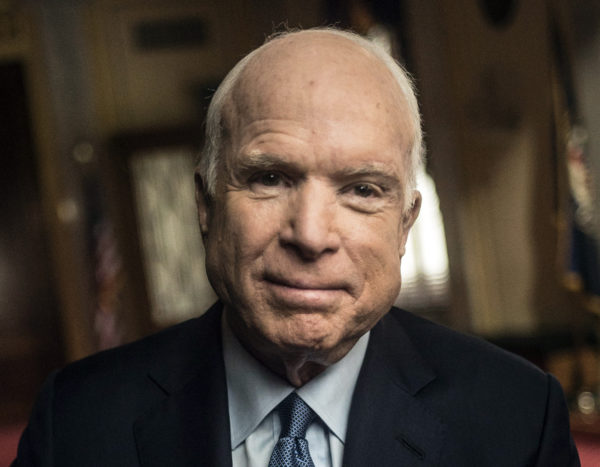Something’s missing in HBO’s new film on John McCain’s life

This image released by HBO shows Sen. John McCain, R-Ariz., who is the subject of the documentary “John McCain: From Whom the Bell Tolls,” debuting on Memorial Day on HBO. Image: HBO/Clair Popkin via AP
NEW YORK (AP) — It’s no coincidence that the words “President Trump” aren’t spoken in “John McCain: For Whom the Bell Tolls”, the HBO documentary on the Arizona senator that debuts on Memorial Day.
There’s enough to talk about, from candidate Trump’s belittling of McCain for being taken prisoner in Vietnam to the senator’s rejection of Trump’s promised repeal of the Obama administration’s health care law. McCain’s family doesn’t want Trump at the 81-year-old senator’s funeral when he succumbs to terminal brain cancer.
The filmmaking family of Peter Kunhardt and his sons, George and Teddy, felt that including Trump would detract from McCain’s story.
“We knew that we wanted to portray John in a way that would stand the test of time,” said Peter Kunhardt. “Five years from now, 10 years from now, these attacks are going to fade into the ether and John’s career is going to stand on its own. We didn’t want the oxygen sucked out of the room by what’s going on right now.”
Nicolle Wallace, a top McCain aide during his 2008 campaign for president, said that was smart.
“I think McCain will matter a lot longer than the politics of the moment, and Trump is all about the politics of the moment,” the current MSNBC host said.
Instead, the filmmakers focused on McCain’s life and service to his country. The son and grandson of U.S. Navy admirals spent five and a half years as a prisoner of war, then entered politics. He’s spent three decades in the Senate and twice ran for president.
The Kunhardts came up with the idea after McCain’s cancer diagnosis was announced and were well-positioned, since they had done a similar film on McCain’s friend Ted Kennedy in the final years before that senator died of the same disease. McCain quickly agreed. He was working on a memoir and saw the documentary as another way to promote his campaign for greater civility and cooperation in public life.
“His story is kind of America’s story,” Peter Kunhardt said. “The combination of his courageous military career and the political career that followed allowed us to look at the last half century of the country through his perspective.”
As a POW, McCain refused when his captors offered to release him before other Americans because his father was Navy brass; he was tortured and nearly died. This weekend marks 45 years from when McCain and other returning POWs were greeted by President Nixon upon their return to the United States. Later in the Senate, McCain worked with Democrat John Kerry, a fellow Vietnam veteran who became an anti-war activist, on normalizing relations with Vietnam.
McCain facing down an angry supporter who was defaming Barack Obama at a 2008 campaign rally is a moment that resonates more with each passing year.
“Like him or hate him, how could you not respect him?” Teddy Kunhardt said.
He has detractors, particularly in his own party. In an all-or-nothing political climate, some don’t like his willingness to work with Democrats and occasionally buck GOP leaders. Respect from the non-ideological media is also a strike against him in some eyes, as Reason.com’s Matt Welch wrote this month: “Like many elitists, McCain shares with the national political media an unconcealed disdain for swaths of the GOP grassroots, particularly as amplified by the conservative media.”
McCain told the Kunhardts he wanted to be portrayed as a human being, and not to avoid his warts. His ex-wife and daughter from his first marriage spoke of their hurt when McCain turned to his current wife, Cindy. McCain later regretted speaking out in favor of the Confederate flag during his bitter 2000 South Carolina primary campaign against George W. Bush. He also said he wished he chose his friend, then-Connecticut Sen. Joseph Lieberman, as his 2008 running mate. But he doesn’t speak ill of Sarah Palin, whose selection proved disastrous.
Half of the Senate turned out for a Washington screening early this month for “For Whom the Bell Tolls”, named after McCain’s favorite novel.
The Kunhardts were amazed by how quickly so many of the people they approached to talk about McCain cleared their schedules for it; friends like former Vice President Joe Biden, and old foes Obama, Hillary Clinton and George W. Bush all talked. Bush told Teddy Kunhardt that he didn’t do many interviews but “I’m doing this because I love John.”
Approaching the end of his life, McCain spoke differently than many of the people they’ve interviewed at the heights of their career, Peter Kunhardt said.
“When you’re facing your own mortality, you speak in a different way, you think in a different way,” he said. “I think John, whether it’s revealing all of the mistakes he’s made along the way and how sorry he is for them, or whether he’s revealing his love for his enemies from the past, is teaching us how to gracefully accept death.” CC
RELATED STORIES:
US Senator John McCain diagnosed with brain cancer
McCain making dramatic Senate return for crucial health vote